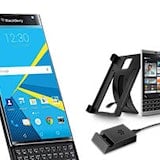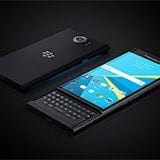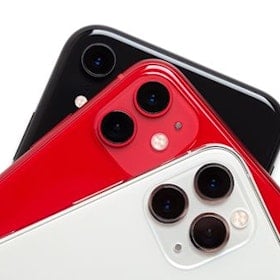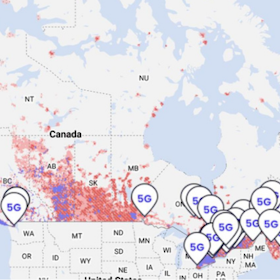 First things first: RIM is no more. The iconic creators of the BlackBerry handset line have done away with their traditional title and simply renamed the entire company “BlackBerry”, which makes perfect sense, really. The BlackBerry range of handsets has been RIM’s sole focus for a long time now, so the renaming should not only make things simpler, but also make the brand name seem more accessible to potentially new customers who won’t look silly in assuming that the company is named after the product or vice versa.
First things first: RIM is no more. The iconic creators of the BlackBerry handset line have done away with their traditional title and simply renamed the entire company “BlackBerry”, which makes perfect sense, really. The BlackBerry range of handsets has been RIM’s sole focus for a long time now, so the renaming should not only make things simpler, but also make the brand name seem more accessible to potentially new customers who won’t look silly in assuming that the company is named after the product or vice versa.
BB10 is BlackBerry’s new, totally rebuilt operating system (OS). The release comes none too soon, as BlackBerry has been failing in the smartphone market for some time now, due to what originally seemed to be an unwillingness to keep up with modern trends. This flaw turned in to an almost desperate sprint to try and catch up with the by then far-ahead competition, culminating in a totally new OS: BB10.
As such, BB10 has been heralded by many as BlackBerry’s last best hope for survival.
So far, BB10 certainly looks like a passable, modern OS with a passable, modern user interface (UI). Rather than relying on buttons, like iOS, WP and Android, BB10 seems to be more gesture-based. There are still some on-screen buttons are various points in the UI system, but generally many objectives are accomplished by various swipes.
 Swiping from the bottom bezel up, for instance, pulls up a screen which displays all current running apps. Swiping from the bottom bezel up and then directly to the right takes the user to the applications menu, where all apps are display in a grid icon layout (no widgets here).
Swiping from the bottom bezel up, for instance, pulls up a screen which displays all current running apps. Swiping from the bottom bezel up and then directly to the right takes the user to the applications menu, where all apps are display in a grid icon layout (no widgets here).
Hold your finger still for a few seconds after swiping up from the bezel, however, and you enter the “Peek” which is sort of similar to a notifications menu. Swiping to the right of the Peek enters the BlackBerry Hub, which is an area where the user can access and manage all of their outstanding messages and calendar alerts from various social media sources and online services. Everything from Email, to Facebook, to LinkedIn.
Conversely, tapping the phone once from the home screen enters dial mode. From here there are three options: to the left is call history, in the middle is contacts (all contacts from all synced services) and to the right is the dial pad.
Even the on-screen keyboard of the Z10 is more gesture-based than most keyboards. The predictive text UI is unique in that possible next words show up on the actual letters which you would type next in order to write them out. Instead of tapping that letter, swipe directly upwards from it and the entire word will be chosen.
Swiping from right to left deletes the last word (a la SwiftKey) and swiping downwards scrolls through the standard letter keys and two more pages of alternate symbols, including numbers. This sounds like a very efficient way of typing to us, although it may be different enough to cause some frustration at first, as many users have spent years building up muscle memory for more simplistic approaches.
The camera app is also interesting in that it brings what Nokia is calling Time Shift. Time Shift tracks the faces of each person in a photo while taking multiple shots. This way, should a person blink, the photographer can take just the portion of the image with their face in it and scroll through multiple options until an appropriate one can be found. This is done without affecting any of the rest of the image. Frankly it looks like sorcery during demonstrations, but we’ll wait until real-world tests show us just how reliable it is.
The browser is reportedly quite snappy and uses the same BB10 keyboard. It also supports Flash, but comes with the option disabled by default.
The overall look and feel of BB10 is that of a quality and solid OS, but it takes more than that to succeed in today’s market. For example, Windows Phone 8 is a fantastic platform with a beautiful and simplistic UI that doesn’t require people to re-think too much of their old smartphone habits, like BB10 will. Despite this, however, WP8 is still having a fairly tough time finding the levels of adoption that it wants.
BB10 is now going to have to compete with 3 major OSes, rather than the mere 2 that WP had to go up against when it launched. The fact that it may be a good OS is not necessarily enough; it needs to be great, easy, fun and offer a unique pull to lure users from established OSes. It’s true that its gesture-based UI isn’t exactly a common theme (forgetting the ill-fated MeeGo OS), but the novelty of that rarity may be cancelled out by the required learning curve attached to it.
On definite attraction for business users is that BB10 offers segmentation within itself. BB10 devices can figuratively split themselves in to both a work phone and a personal handset and function as two different smartphones simultaneously. That means you can set all of your work stuff to your ‘business’ half of the device and all of your personal stuff to the other.
Both work as if they were part of one phone for the most part, but say you go on holiday and want to leave the work phone at home. BB10 lets you disable that part of your device, blocking all work-related calls, emails and texts etc, while still keeping the personal part active. This can also be done in reverse if you have important business to attend to and don’t want your personal life popping up and getting in the way.
Ultimately we’re impressed with what little we’ve seen on BB10 so far and, hopefully, it should be enough to keep BlackBerry afloat for the foreseeable future.
Related Articles
Related Topics
BlackBerry BB10 BlackBerry Z10 BlackBerry Q10Popular Topics
Android Apple iPhone Samsung Google iOS Cell phone plans Rogers Telus BellFind Better Phones and Plans
Hundreds of cell phone plans unpacked. All the facts. No surprises.



































